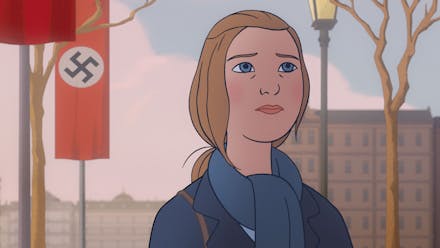The painter Charlotte Salomon has long drawn comparisons to Anne Frank. Like the famous Dutch diarist, Salomon was a young Jewish woman forced into hiding during World War II, who took refuge in her art — art that would ultimately outlive her, forming a first-hand account of a tragic, violent history.
In Salomon’s case, her most significant work was Leben? oder Theater? (Life? Or theatre?), a series of autobiographical paintings with a narrative throughline and first-hand account of life in Berlin under the Nazis, plus playful retellings of her relationships and studies. Made up of hundreds of paintings and transparent overlays of poems and writings, it’s considered an early precursor to the graphic novel, and now partly forms the basis of this animated biopic about Salomon’s tragic life (like Frank, she ultimately died in a concentration camp).

This is a mostly affecting film, which retells her story in a way that seems designed largely for a young adult audience, leading to occasionally clichéd storytelling. As well as her burgeoning artistic interests and the growing fascist threat of the Nazi party, emphasis is placed on Charlotte’s early romantic relationships, which, while well-pitched and sweetly portrayed, sometimes feel like the least interesting part of Charlotte’s life.
A righteous, angry take on historical events
In fact, for an account of an unconventional artist, the animation is disappointingly conventional — unlike, say, the impressionistic painting-led artwork of Van Gogh biopic Loving Vincent (the two films share producers, and marketing for Charlotte draws attention to this fact). Which is not to say it’s lacking in artistry: the character design and colouring has flashes of last year’s beautiful, emotional refugee docu-drama Flee, with clean, smooth motion and sharp, expressive observations.
The filmmakers choose not to show the horrors of Auschwitz, where Charlotte spent her final days, and the exact nature of the relationship with her Grosspapa is never made entirely clear (it’s thought, though never decisively proven, that he abused his granddaughter). But for younger viewers especially, it still feels like a righteous, angry take on historical events, bolstered by strong voice work from Keira Knightley and Jim Broadbent.
